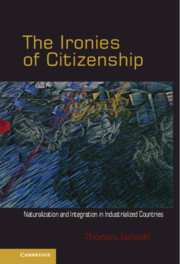Crossref Citations
This Book has been
cited by the following publications. This list is generated based on data provided by Crossref.
Janoski, Thomas
2010.
The Dynamic Processes of Volunteering in Civil Society: A Group and Multi-Level Approach.
Journal of Civil Society,
Vol. 6,
Issue. 2,
p.
99.
Michalowski, Ines
2011.
Required to assimilate? The content of citizenship tests in five countries.
Citizenship Studies,
Vol. 15,
Issue. 6-7,
p.
749.
2011.
Publications Received.
Contemporary Sociology: A Journal of Reviews,
Vol. 40,
Issue. 1,
p.
117.
Michalowski, Ines
and
van Oers, Ricky
2012.
How Can We Categorise and Interpret Civic Integration Policies?.
Journal of Ethnic and Migration Studies,
Vol. 38,
Issue. 1,
p.
163.
Dronkers, Jaap
and
Vink, Maarten Peter
2012.
Explaining access to citizenship in Europe: How citizenship policies affect naturalization rates.
European Union Politics,
Vol. 13,
Issue. 3,
p.
390.
Bauböck, Rainer
2012.
Migrations: Interdisciplinary Perspectives.
p.
3.
Koopmans, Ruud
2012.
The post‐nationalization of immigrant rights: a theory in search of evidence1.
The British Journal of Sociology,
Vol. 63,
Issue. 1,
p.
22.
Wright, Matthew
and
Bloemraad, Irene
2012.
Is There a Trade-off between Multiculturalism and Socio-Political Integration? Policy Regimes and Immigrant Incorporation in Comparative Perspective.
Perspectives on Politics,
Vol. 10,
Issue. 1,
p.
77.
Shevel, Oxana
2012.
The Politics of Citizenship Policy in Post-Soviet Russia.
Post-Soviet Affairs,
Vol. 28,
Issue. 1,
p.
111.
Koopmans, Ruud
Michalowski, Ines
and
Waibel, Stine
2012.
Citizenship Rights for Immigrants: National Political Processes and Cross-National Convergence in Western Europe, 1980–2008.
American Journal of Sociology,
Vol. 117,
Issue. 4,
p.
1202.
Simon, Thomas
2013.
Citizenship as a weapon.
Citizenship Studies,
Vol. 17,
Issue. 3-4,
p.
505.
Kivisto, Peter
and
Wahlbeck, Östen
2013.
Debating Multiculturalism in the Nordic Welfare States.
p.
1.
Janoski, Thomas
2013.
The complexities of measuring naturalization rates in advanced industrialized countries.
Comparative European Politics,
Vol. 11,
Issue. 5,
p.
649.
Gilbertson, Greta
2013.
The Encyclopedia of Global Human Migration.
Street, Alex
2013.
Naturalization Dynamics in Immigrant Families.
Comparative Migration Studies,
Vol. 1,
Issue. 1,
p.
23.
Helbling, Marc
2013.
Validating integration and citizenship policy indices.
Comparative European Politics,
Vol. 11,
Issue. 5,
p.
555.
Vink, Maarten Peter
and
Bauböck, Rainer
2013.
Citizenship configurations: Analysing the multiple purposes of citizenship regimes in Europe.
Comparative European Politics,
Vol. 11,
Issue. 5,
p.
621.
Duyvendak, Jan Willem
van Reekum, Rogier
El-Hajjari, Fatiha
and
Bertossi, Christophe
2013.
Mysterious multiculturalism: The risks of using model-based indices for making meaningful comparisons.
Comparative European Politics,
Vol. 11,
Issue. 5,
p.
599.
Banting, Keith
and
Kymlicka, Will
2013.
Is there really a retreat from multiculturalism policies? New evidence from the multiculturalism policy index.
Comparative European Politics,
Vol. 11,
Issue. 5,
p.
577.
Helbling, Marc
and
Vink, Maarten Peter
2013.
The use and misuse of policy indices in the domain of citizenship and integration.
Comparative European Politics,
Vol. 11,
Issue. 5,
p.
551.





